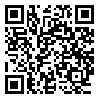Volume 8, Issue 2 (11-2024)
J Social Behav Communit Health 2024, 8(2): 1380-1393 |
Back to browse issues page
Download citation:
BibTeX | RIS | EndNote | Medlars | ProCite | Reference Manager | RefWorks
Send citation to:



BibTeX | RIS | EndNote | Medlars | ProCite | Reference Manager | RefWorks
Send citation to:
Sorbi M H, Ardian N, Qane-Mokhlesoon S, Habib S E. Psychometric Features of the Emotional Climate Scale for Couples in Divorce Applicants. J Social Behav Communit Health 2024; 8 (2) :1380-1393
URL: http://sbrh.ssu.ac.ir/article-1-263-en.html
URL: http://sbrh.ssu.ac.ir/article-1-263-en.html
1- Department of Psychology, Faculty of Educational Sciences and Psychology, University of Birjand, Birjand, Iran
2- Social Determinants of Health Research Center, Non-communicable Diseases Research Institute, Department of Health Education and Promotion, School of Public Health, Shahid Sadoughi University of Medical Sciences, Yazd, Iran ,n_ardian1382@hotmail.com
3- Department of Counseling and Guidance, Islamic Azad University, Meybod Branch, Yazd, Iran
4- dSouthern Cross Institute, Sydney, Australia
2- Social Determinants of Health Research Center, Non-communicable Diseases Research Institute, Department of Health Education and Promotion, School of Public Health, Shahid Sadoughi University of Medical Sciences, Yazd, Iran ,
3- Department of Counseling and Guidance, Islamic Azad University, Meybod Branch, Yazd, Iran
4- dSouthern Cross Institute, Sydney, Australia
Abstract: (938 Views)
Background: In Iranian courts, counseling centers, and research institutes, the Family Emotional Atmosphere Questionnaire (FEAQ) by Navardgahfard in 1994 is widely used to assess the status of marital relationships. However, the FEAQ's contents are outdated, containing irrelevant questions, and lacking valid psychometric properties. Therefore, the aim of the present study is to revise and validate the psychometric properties of the Emotional Climate Scale for Couples (ECSC).
Methods: This study was descriptive-correlational in nature and had practical implications. It was conducted from January 17th to July 30th, 2023. All divorce applicants referred by the courts to family counseling centers were included in the study population. Initially, the FEAQ was extracted from the website and modified to consist of 21 questions related to emotional climate between couples.
Results: Subsequently, the face validity of ECSC was confirmed by experts, and exploratory factor analysis (N=307) demonstrated two subscales of lack of feelings and cooperation, and forced with limitations, explaining 63.26% of the variance in the 21 ECSC items. Confirmatory factor analysis (N=205) also indicated an acceptable fit for the ECSC model and showed good construct validity. The test-retest reliability (N=35, with a three-week interval) was 0.83 for the total scale, 0.82 and 0.81 for the two subscales, respectively, while Cronbach's alpha coefficients for the two factors were 0.93 to 0.94 and 0.96 for the total scale.
Conclusion: Therefore, ECSC is a reliable and valid tool for assessing the emotional climate between couples and has wide applicability.
Methods: This study was descriptive-correlational in nature and had practical implications. It was conducted from January 17th to July 30th, 2023. All divorce applicants referred by the courts to family counseling centers were included in the study population. Initially, the FEAQ was extracted from the website and modified to consist of 21 questions related to emotional climate between couples.
Results: Subsequently, the face validity of ECSC was confirmed by experts, and exploratory factor analysis (N=307) demonstrated two subscales of lack of feelings and cooperation, and forced with limitations, explaining 63.26% of the variance in the 21 ECSC items. Confirmatory factor analysis (N=205) also indicated an acceptable fit for the ECSC model and showed good construct validity. The test-retest reliability (N=35, with a three-week interval) was 0.83 for the total scale, 0.82 and 0.81 for the two subscales, respectively, while Cronbach's alpha coefficients for the two factors were 0.93 to 0.94 and 0.96 for the total scale.
Conclusion: Therefore, ECSC is a reliable and valid tool for assessing the emotional climate between couples and has wide applicability.
Type of Study: Original Article |
Subject:
Psychology
Received: 2024/09/23 | Accepted: 2024/10/6 | Published: 2024/11/20
Received: 2024/09/23 | Accepted: 2024/10/6 | Published: 2024/11/20
Send email to the article author
| Rights and permissions | |
 |
This work is licensed under a Creative Commons Attribution-NonCommercial 4.0 International License. |







